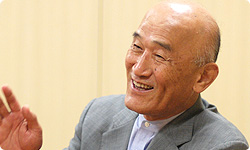5. A Game You Can Play Years Later
I feel like video games have changed since Super Mario Bros. came out in 1985. Until then, we thought of video games as something that you put a coin into to play at an arcade, but now you could also play at home. Nintendo’s Donkey Kong was like that, as well as Namco’s Xevious and many games by other companies. But Super Mario Bros. was clearly designed for home use from the very start. I feel like video games really changed when Super Mario Bros. came out, followed by Dragon Quest.16 16 Dragon Quest: An RPG released by Enix (now Square Enix) for the Famicom system in May 1986.
That’s really true.
I think another big factor was the birth of the character business. Super Mario Bros. truly was the start of that.
Mario became popular in Japan and the character licensing business began.
At the time, we didn’t have a department for licensing, so general affairs handled all that. Countless companies came with licensing requests - so much so that the person in charge couldn’t do anything else.
Oh, really?
But at the time, Yamauchi-san told me it was okay to license Mario, but that we mustn’t license Zelda.
Why was that? That wasn’t because general affairs would be so busy they couldn’t take care of their other work, was it?
No, it wasn’t that. He said even if you license Zelda, there’s no way it could beat Mario. That’s why he said we shouldn’t license Zelda.
Wow. That’s amazing.
So we only licensed Mario back then.
That is a direct manifestation of Yamauchi-san’s idea that in entertainment, people’s popularity centres around just one thing. Nothing could come of having Mario and Zelda compete with each other in the character business.
But that’s how popular Mario was. One of the things that struck me when I first heard about Super Mario Bros. was how few pixels he was made out of. It would have been impossible to show his hair, so they had to make him wear a hat. In order to hide his mouth, they gave him a big nose and moustache. And made his clothes overalls.
The entire design is based on function, like making it easy to tell which direction he is facing.
That’s the way it was at first, but even as games’ visual capacities have increased, those basic lines have never changed. I think that may be why, even after 25 years, everyone still loves Mario.

Right now, I’m trying to determine the reason you can still enjoy playing Super Mario Bros. after 25 years.
As a professor at Ritsumeikan University, you are engaged in a scholarly analysis of the appeal of video games.
I’m still in the middle of researching it. I started in 2009, and the students who are the target of my study are younger than Super Mario Bros.!
Because today’s university students were born after the game was released.
No one in the laboratory has ever played Super Mario Bros. on the Famicom before. I film how they look when they play the game, as well as all the contents of the game. When I give them Super Mario Bros., they start enjoying it right away.
Even though the game was made before they were born, they can dive right into the world of Super Mario Bros.?
Yes. So when I watch the recordings, I feel like there must be some special secret to Super Mario Bros. It’s fun for people standing around watching, and you can tell the player is really into it. I have them play it three times, and they all tell me thank you before they leave.
They tell you thanks. (laughs)
They say, “Thank you very much!” (laughs) When I see how happy they are, I feel like there must be some secret to this game. I bet people 50 or 100 years from now who play Super Mario will still find it to be fun.

You think there must be something in the game that inspires such enjoyment.
Yes. The basic elements of what people enjoy don’t change that much, so 25 years from now - although I won’t be alive then - or 100 years from now, I’d like to see how people enjoy Super Mario.
That far in the future... (laughs)
Too bad I won’t be able to see that... But my research results may help me to more clearly state the essence of the enjoyment of Super Mario Bros.
I see. Today, two seasoned experts who played a crucial role in the Super Mario Bros. game’s lasting success...
They aren’t all good memories... (laughs)
That’s for sure. (laughs)
(laughs) I’m sure it wasn’t always easy, but even including those hard times, nothing ever goes to waste. They will make something else become possible later on. I feel it was a miracle on how the Famicom was born of a confluence of happenstance and good luck, and how, after weathering various happenings, Mario appeared at just the right time and remains popular to this day. Whew...It sure has been fun. (laughs)
I completely agree. It hasn’t faded at all after 25 years.
Something else I’ve realised all over again from today’s conversation is how the future can be changed depending on whether you were able to grab an opportunity or let it slip through your fingers. I want to keep working as well to retain the universal appeal across future generations. Thank you for your time today.

Thank you.
